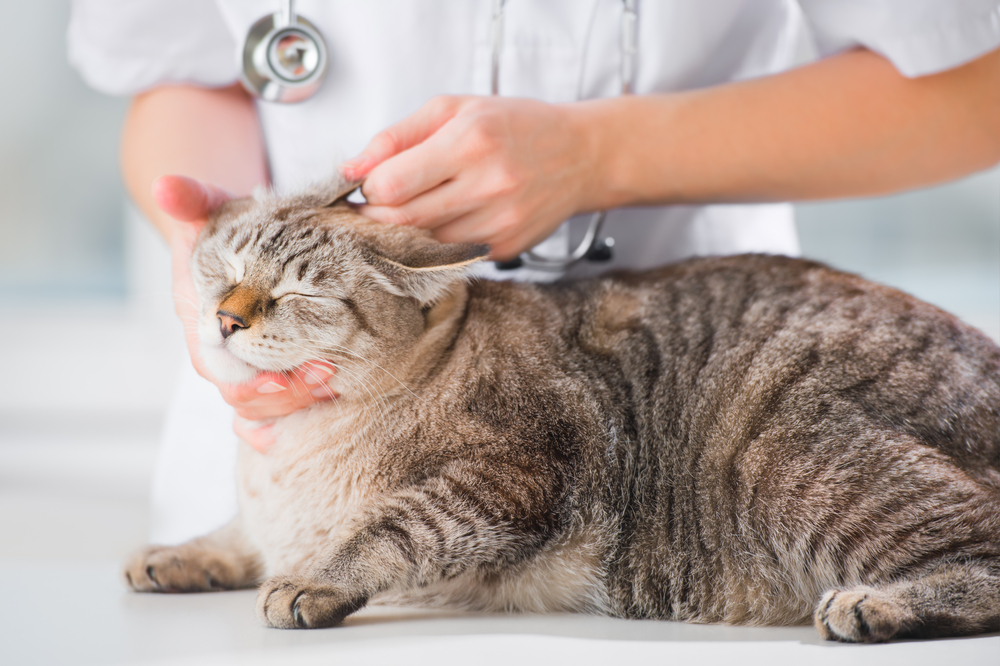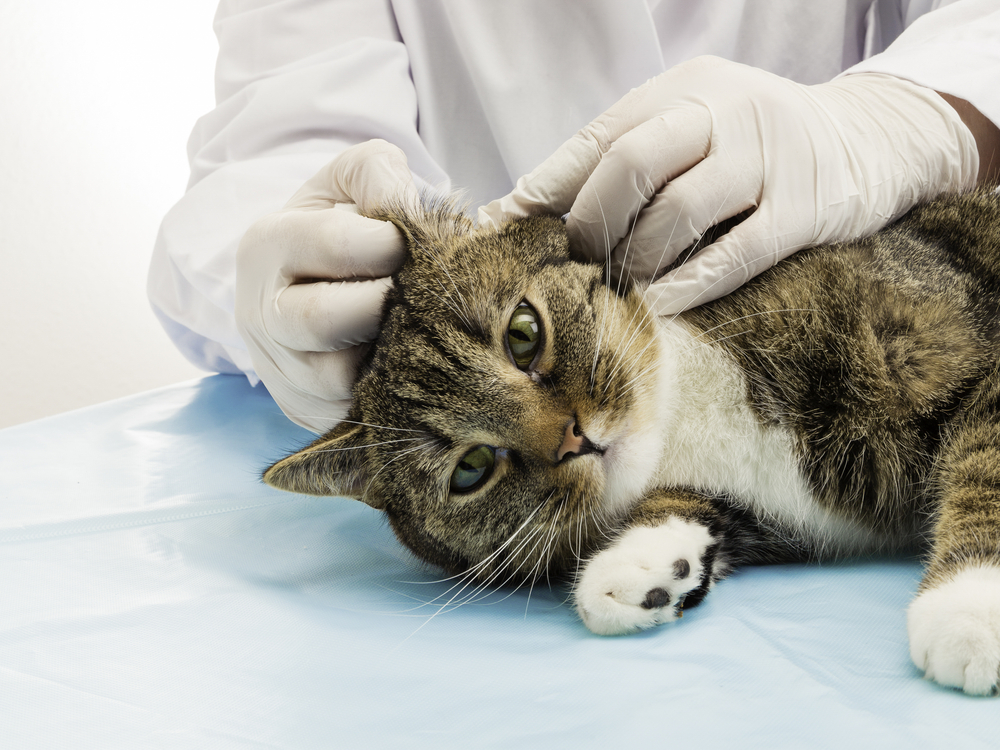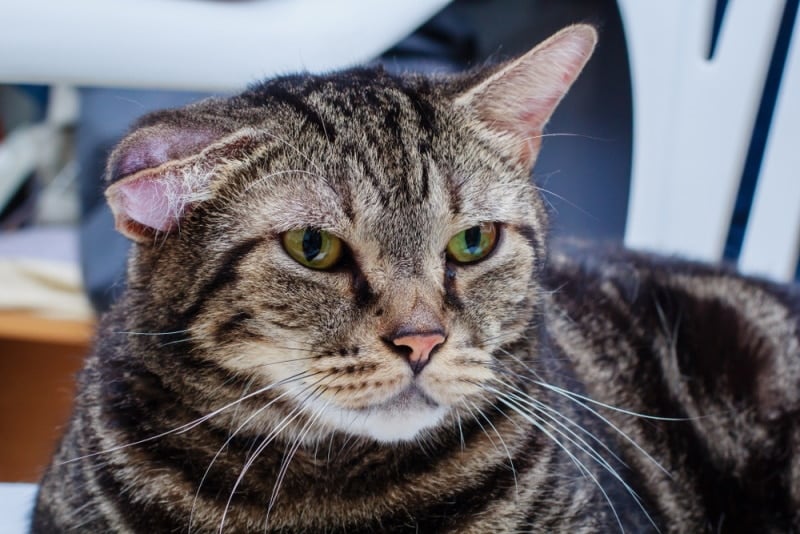Your cat’s ears are fascinating parts of their body. They can give you information about how your cat is feeling, and petting, scratching, or massaging them will strengthen your bond. However, various ear problems can occur in cats, one being the development of an aural hematoma.
Your cat’s ear flap (also called the pinna, from the Latin meaning wing or feather) has delicate blood vessels. If one ruptures due to trauma, an aural hematoma can develop on the inside of the ear. This is when the blood from the broken vessel collects and causes swelling that can usually be seen on the inside of the ear flap. While it’s possible for some aural hematomas to go away on their own, others will need medical intervention.
The term aural refers to something relating to the ear or the sense of hearing. The term hematoma is defined as a pool of blood that forms in an organ, tissue, or body space. Damage to the blood vessels in your cat’s ears while the skin is still intact can result in such formations.
Sometimes, leaving an aural hematoma untreated can have serious consequences for your cat’s well-being. It’s typically painful, and the discomfort causes cats to scratch, aggravating the problem and increasing the size of the hematoma. Some of these cases might even require surgery.
What Causes an Aural Hematoma in Cats?
Violent head shaking, scratching, and other types of trauma to the ears can cause blood vessels to burst. This causes blood to collect inside the pinna, between the cartilage and the skin. An aural hematoma can be identified easily as a small fluid-filled lump inside your cat’s ear flap. It’s important to take your cat to the vet if you suspect they have one. Most aural hematomas are secondary to a problem that causes your cat to itch.
Ignoring an aural hematoma could result in the ear becoming deformed or morphing into a “cauliflower” shape, causing future trouble and worsening your cat’s underlying problem.
Luckily, aural hematomas are fairly rare in cats. Your cat won’t necessarily develop one just from scratching their ears once or twice. However, they can be common secondary issues from problems that cause excessive scratching, including:
- Parasites, such as ear mites, fleas, or ticks
- A foreign object lodged in the ears
- Ear infections
- Allergies
- Polyps or tumors
- Auto-immune diseases
- A recent bite

Signs of an Aural Hematoma
There are some signs that you may observe as an aural hematoma is forming. Observing these can help you quickly ascertain that something might be wrong with your cat. There are important clues to look out for, and if you observe these signs, you should take your cat to the vet for a checkup.
- Your cat shakes their head frequently.
- Your cat intensely scratches one or both of their ears.
- There is excessive wax or an odor coming from your cat’s ears.
- One or both of your cat’s ears feel warm to the touch.
- One or both of your cat’s ears appear crusty.
- Your cat seems to be uncomfortable, especially when you try to inspect their ears.
- There is swelling on or near one or both of your cat’s ears.
- One of your cat’s ears appears different than the other in some way (it is warmer, thicker, or asymmetrical).
- You witnessed or suspect that your cat recently got physically hurt, especially near their head (your cat fell down, an unsupervised child pulled your cat’s ear, a dog or another animal bit your cat, etc.)
There is no “ear preference” when it comes to aural hematomas. One or both of your cat’s ears may be affected, and there is no preference between the right or left one. These signs are often associated with other problems involving your cat’s ears, which definitely warrant a trip to your vet.

How Aural Hematomas Are Treated
Your vet will need to assess if the hematoma is causing your cat pain and determine its size before they know what to do about it. If the swelling is minor, your vet might send you home with the expectation that it’ll resolve itself within a couple of weeks. However, if the swelling is bad enough, the vet might determine that your pet needs surgery.
- Drainage of the aural hematoma with an appropriate needle
- Medication that is placed inside your cat’s ear to treat the hematoma
- Medication that is prescribed to your cat
If your cat has recurring, long-term issues with an aural hematoma, your vet may opt for a surgical procedure appropriate for your cat. This may involve anesthesia, but it may also be accomplished under heavy sedation. The goal of this procedure is to adequately drain the aural hematoma and address any other issues as necessary. This is done on a case-by-case basis, and it’s best to follow your vet’s lead on the best treatment options for your cat.
In addition to treating the aural hematoma, your vet will diagnose, offer treatments, and advise you on the underlying causes affecting your cat’s ears and overall health. For example, 50% of otitis in cats is caused by ear mites. The good news is that they respond very well to treatments. Follow any medication and at-home instructions given by your vet to ensure prompt and effective resolution of not just the aural hematoma but also the underlying cause (if there is one).
The prognosis is good to excellent as long as the underlying cause is addressed. The survivability rate is very high, so you typically don’t need to worry as long as you seek treatment quickly. Some cats may have an ear that droops a little after undergoing treatment for an aural hematoma.

Conclusion
Aural hematomas can be painful to your pet and require medical attention. Although not all aural hematomas require surgery, it’s important to take your cat to the vet for care because hematomas can be painful and may result in permanent disfiguration of their ear if it isn’t treated quickly or properly. Your vet will also need to figure out what is causing your cat to scratch or shake their head so much if that is the cause. Your cat could need allergy medicine or another long-term treatment once the hematoma has cleared, to prevent it from recurring.
See Also:
Featured Image Credit: BabyMosquito, Shutterstock











